The U.S. presidential election is coming again when people still clearly remember the slogan of Donald Trump's campaign for the U.S. presidency four years ago – "Make America Great Again." But Trump seems to have forgotten another sentence that Americans have always been proud of, which is, "With great power, comes great responsibility."
As of May 13, the world’s cumulative number of diagnosed COVID-19 cases exceeded 4.34 million. And the United States has the most confirmed cases with more than 1.408 million, and a cumulative death toll of over 83,000. Unfortunately, in a world reeling from a pandemic induced crisis, Spider-Man, Iron Man, and Captain America – the embodiments of American values and identity, were all absent from the global fight against pandemic.
At a White House news conference on April 14,President Trump said the World Health Organization (WHO) had "failed in its basic duty and it must be held accountable." He has instructed his administration to halt funding to the WHO over its handling of the coronavirus pandemic while a review of its response to the global crisis is undertaken. Calling the UN body "China-centric," Trump also said the WHO had promoted China's "disinformation" about the virus and claimed that likely led to a wider outbreak.
How well Trump's scapegoating of the WHO will play out in the U.S. election is impossible to predict, but on the world stage it will undoubtedly be seen as yet another step in the accelerating U.S. abdication of global leadership.
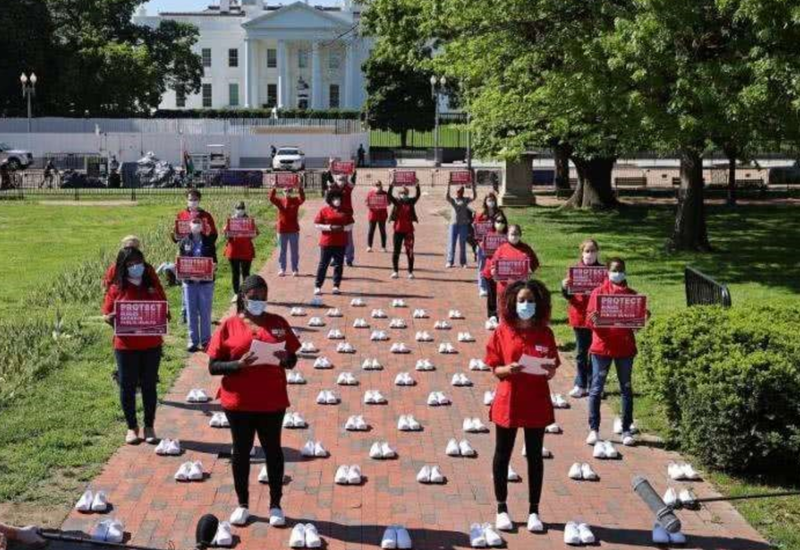
On May 7, American nurses protest outside the White House over the lack of personal protective equipment, with 88 pairs of empty shoes lined up to represent the nurses who had died thus far during the COVID-19 pandemic.
Timeline of Coronavirus Pandemic and U.S. Responses
The Trump administration claims that the WHO "failed to share information in a timely and transparent fashion," but what is the truth? The search for answers should start with the “WHO Timeline - COVID-19” released on its official website on April 27. The document clearly shows that as early as January, China notified the WHO and the United States of the epidemic outbreak in Wuhan, capital city of China’s Hubei Province.
The WHO first raised the alert over the outbreak of the disease on January 5, and from January 7 onwards it briefed public health officials from the U.S. and other national governments on the outbreak through regular teleconference calls. On January 9, the WHO distributed guidance to member states for their own risk assessment and planning.
According to Michael Ryan, executive director of WHO Health Emergencies Programme, some 15 staff members from the U.S. Centers for Disease Control and Prevention (CDC) have been seconded to the UN agency since January 1, joining two U.S. government officials assigned there long term. It means that there has been nothing hidden from the U.S., since day one.
Trump and his supporters have focused on a January 14 WHO tweet reporting the findings of preliminary Chinese studies suggesting "no clear evidence" of human-to-human transmission, but WHO also briefed the press on the same day, that human-to-human transmission was still a strong possibility given the experience of past coronavirus epidemics and urged suitable precautions.
On January 23, the WHO updated its account of the coronavirus threat, confirming human-to-human transmission and warning that the global risk was high. One week later it formally declared a global emergency.
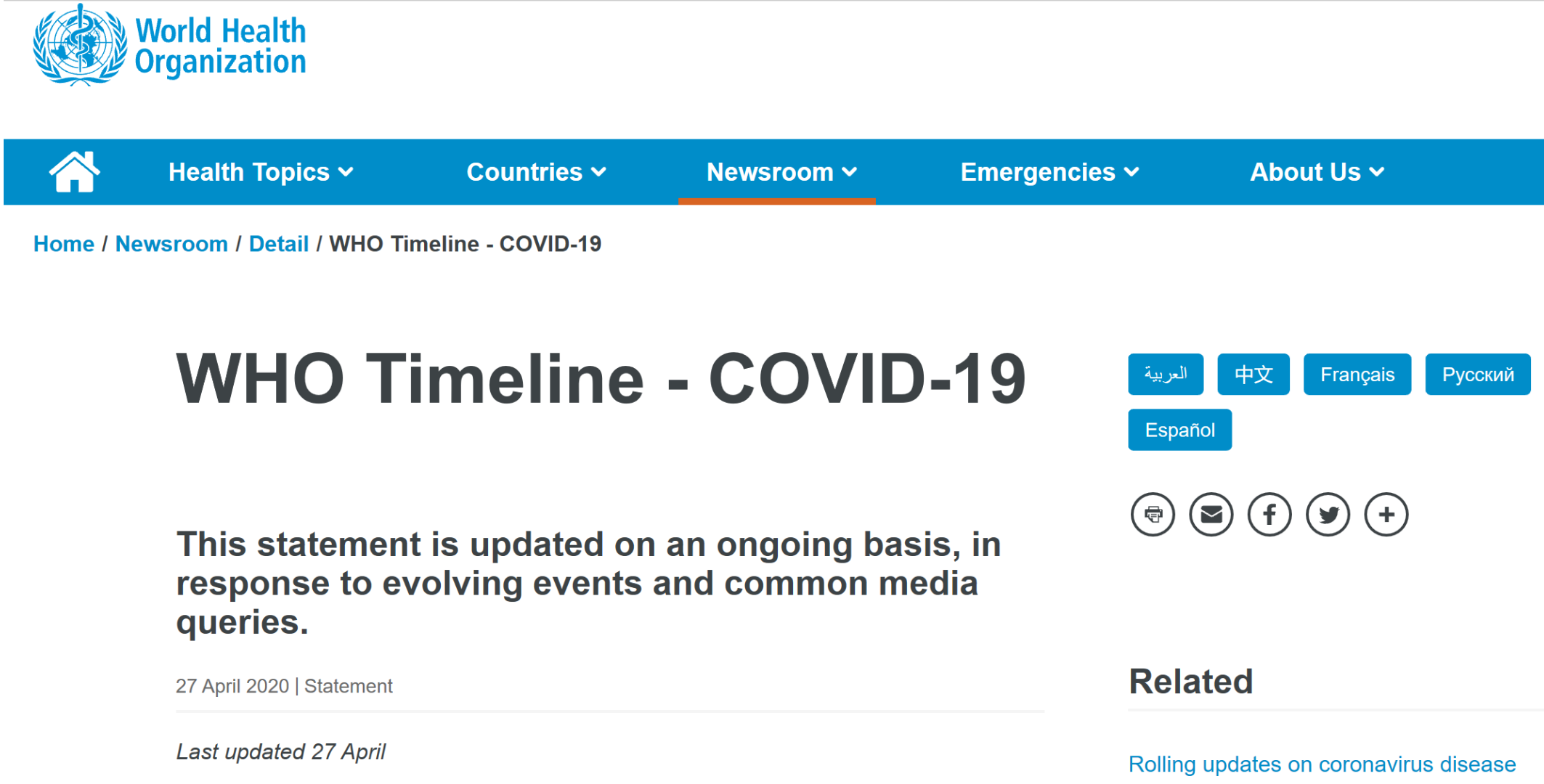
The “WHO Timeline - COVID-19” released on its official website on April 27.
The claim that the delay in the WHO acquiring samples crippled the international response is also untenable. Chinese scientists publicly released the genetic sequence of the novel coronavirus on January 11. By early February the WHO was in a position to distribute a COVID-19 test worldwide, but the U.S. government opted not to have it fast-tracked through approval. The CDC instead produced its own test at about the same time, but it was flawed and had to be recalled. Therefore, the U.S. testing would be set back more than six weeks compared to the rest of the world.
While virtually no testing was under way in the U.S. throughout February, Trump assumed that the consequently low number of confirmed U.S. cases meant that his country had somehow escaped. "The coronavirus is very much under control in the U.S.," he boasted on February 24, nearly a month after the WHO declaration of emergency. "We are in contact with everyone and all relevant countries. CDC & WHO have been working hard and very smart."
Just on January 24, Trump tweeted, “China has been working very hard to contain the coronavirus. The United States greatly appreciates their efforts and transparency.” He repeatedly expressed admiration for Chinese President Xi Jinping, even as recently as late March, tweeting after a telephone call, "We are working closely together. Much respect!"
However, by April, as Trump faced intensifying criticism for the failure to contain the epidemic, he swung to attacking China, a strategy which Republican pollsters suggest may help him against Joe Biden, his Democratic challenger.
At the same time, the United States announced that it would suspend its share of the funding to the WHO while accusing the WHO of "hiding the epidemic."
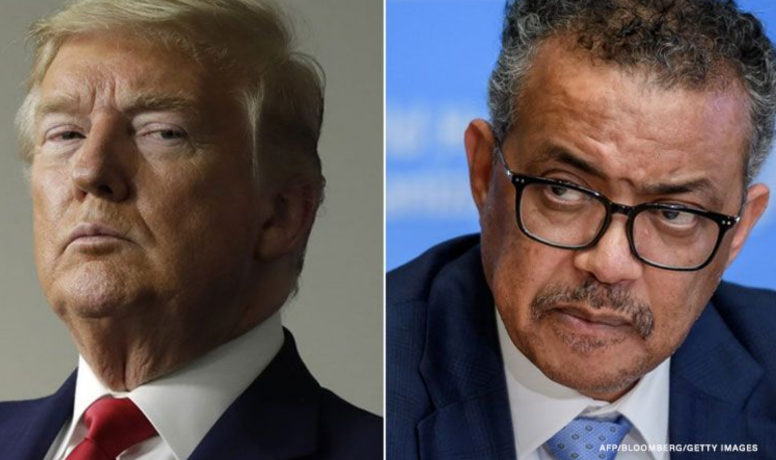
The picture used by CNN in its report “Trump halts World Health Organization funding over handling of coronavirus outbreak” on April 15.
A Cornered Trump and His Blame Game
According to an article issued by Foreign Policy on February 10, the Trump administration has planned to cut global health funds in its 2021 budget proposal, including the country's annual allocation of funds to the WHO. The U.S. Congress authorized about US $123 million in funding for the WHO in the fiscal year 2020. The Trump administration proposed that the American WHO commitment be reduced to just under US $58 million for fiscal year 2021.
The WHO's funding mainly falls into two categories: membership dues and voluntary contributions. As of March 31, the U.S. is behind in its assessed fee payments. It currently owes about US $198 million in membership dues, including some amounts owed for previous years, according to the WHO.
Indeed, since Trump’s presidency, the U.S. has already quit the UN Human Rights Council, the UN cultural agency UNESCO, the Universal Postal Union, and a global accord to tackle climate change, the Paris Agreement.
CNN published a report on April 15 titled “Trump halts World Health Organization funding over handling of coronavirus outbreak.” The article pointed out that Trump's announcement comes in the middle of the worst global pandemic in decades as he belligerently defends his own handling of the outbreak in the United States. Amid swirling questions about whether Trump downplayed the crisis or ignored warnings from members of his administration about its potential severity, Trump has sought to assign blame elsewhere, including at the WHO and on the news media. It is obvious that the White House is trying to find scapegoats for the fatal mistakes that the President made during the early stages of this virus.
For weeks, President Trump has faced relentless criticism for having overseen a slow and ineffective response to the coronavirus pandemic, failing to quickly embrace public health measures that could have prevented the disease from spreading. A majority of American voters (52 percent) disapprove of Trump's handling of the coronavirus outbreak and believe he did not take the pandemic seriously enough at the beginning of the crisis, according to an NBC News-Wall Street Journal poll conducted April 13-15.
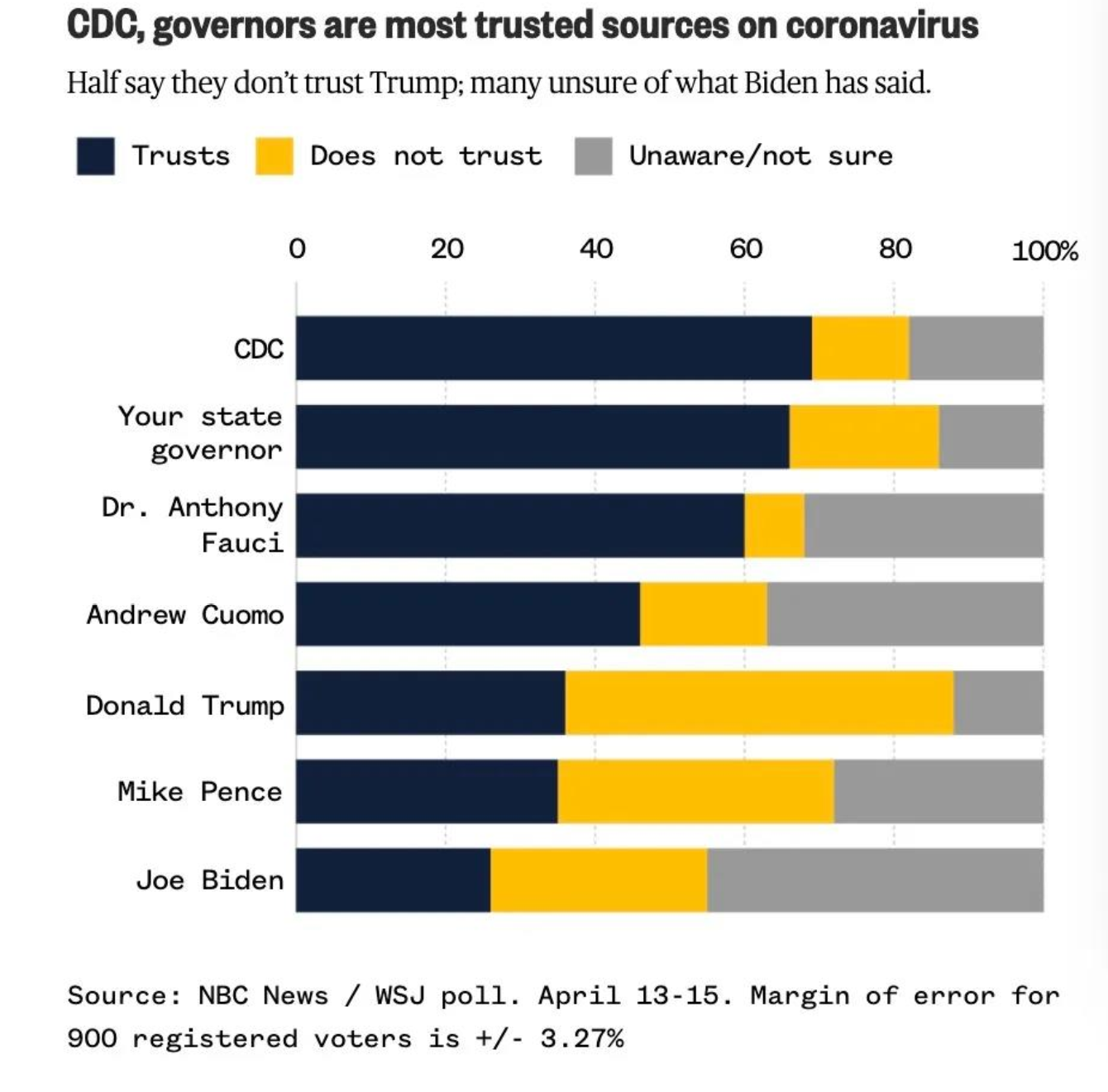
52 percent of respondents say they generally do not trust Trump's rhetoric about the virus, while just 36 percent say they do. This pales in comparison to Americans' trust in the Centers for Disease Control and Prevention (CDC) and Anthony Fauci, the nation's top infectious disease expert.
Sen. Patrick Leahy, the top Democrat on the Senate Appropriations Committee, said in a statement, "The White House knows that it grossly mishandled this crisis from the beginning, ignoring multiple warnings and squandering valuable time, dismissing medical science, comparing COVID-19 to the common flu, and saying 'everything will be fine,'" Leahy added. "Not wanting to take responsibility as the deaths continue to mount, he (Trump) blames others."
"International cooperation on public health has never been more critical," House Intelligence Committee Chairman Adam Schiff tweeted. "Freezing funding for the WHO will only make it worse."
A Pandemic Requires Globally Concerted Action
People involved in the pandemic response around the world reacted with horror to the news. Trump's decision is a "crime against humanity," tweeted Richard Horton, editor-in-chief of the U.K. medical journal The Lancet. "Every scientist, every health worker, every citizen must resist and rebel against this appalling betrayal of global solidarity," Horton said in the tweet. He also called for Anthony Fauci, the top infectious disease expert in the U.S. government, to "be on the side of truth" and "correct your President."
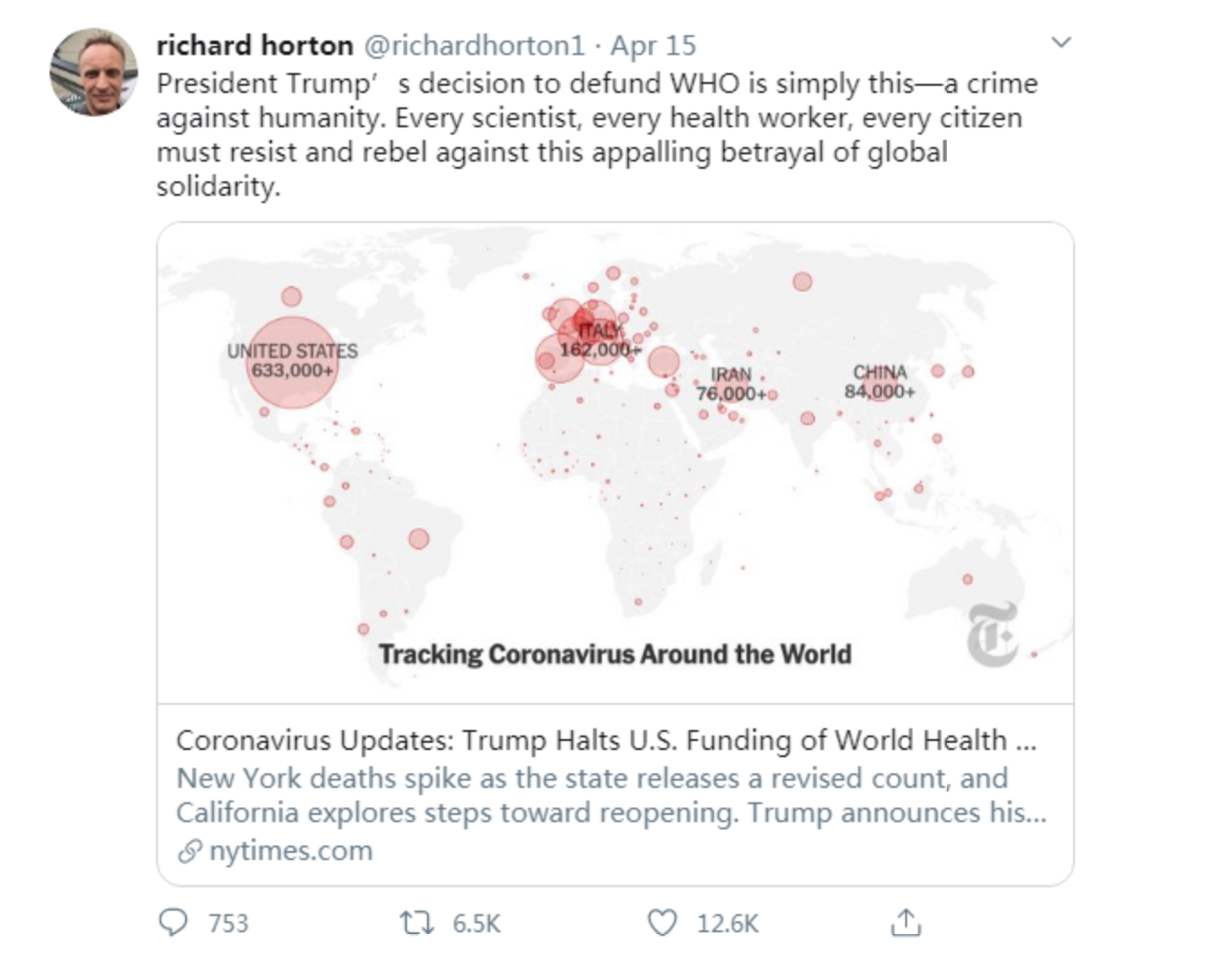
Trump's decision is a "crime against humanity," tweets Richard Horton, editor-in-chief of the U.K. medical journal The Lancet.
"This is a short-sighted decision which will be disastrous for the agency," says Devi Sridhar, a global health expert at the University of Edinburgh in the U.K. "We need the WHO more than ever to support all countries, especially low- and middle- income ones."
Robert Redfield, the director of the Centers for Disease Control and Prevention (CDC), said his agency would continue to work with the WHO despite Trump's decision to freeze funding. "The WHO has been a long-term and still is a great partner for us," Redfield said during an interview with CBS, adding that "we're continuing to work side by side to do the best that we can to limit the spread of disease and to protect the American people."
Trump's actions could significantly hamper the world’s fight against COVID-19, says Lawrence Gostin, director of the O’Neill Institute for National and Global Health Law at Georgetown University. “If the WHO is ensnared in a political and funding crisis, it simply won't be able to provide the leadership that is so urgently needed in this unique time in human history.”
After the United States announced its suspension of funding for WHO, the leaders of the Group of Seven (G7) held a conference call on April 16. Leaders from six other countries including Japan, Germany, France, the United Kingdom, Italy, and Canada expressed their strong support for the WHO and underscored the key role it must play together with all states, international institutions and programs focusing on vaccines, healthcare, and the strengthening of health systems.
Some countries have stepped up their own financial backing. For example, after donating US $20 million to WHO, China announced an additional US $30 million donation on April 23, and will continue to provide support and assistance within its ability. The U.K. has also announced GBP 200 million in new funding for international efforts to contain and combat the pandemic, of which GBP 65 million is earmarked for the WHO.
The announcement came on the day that WHO's first "solidarity flight" left Ethiopia carrying medical supplies to African countries to assist them in fighting COVID-19. United Nations Secretary-General Antonio Guterres said in a statement it was "not the time to reduce the resources for the operations of the World Health Organization or any other humanitarian organization in the fight against the virus."
WHO’s director-general Tedros Adhanom Ghebreyesus strongly urged world leaders not to politicize the pandemic. "We will have many body bags in front of us if we don't behave," said Tedros.